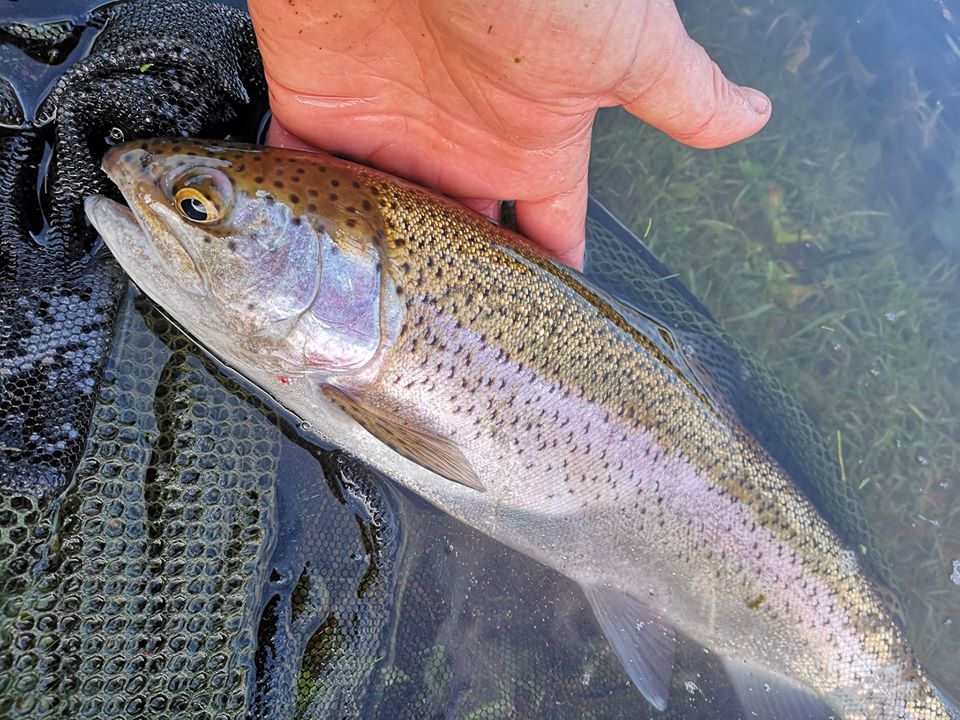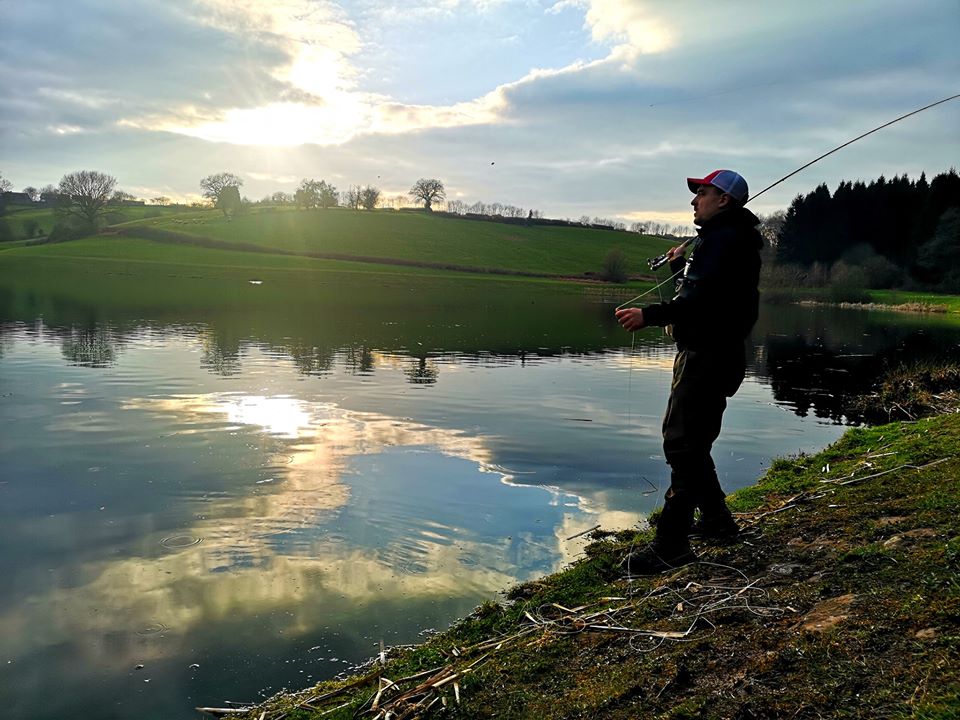Game fishing is the most widespread type of freshwater angling in Wales. In this kind of fishing you try to catch fish in freshwater, rather than the sea and sometimes the fish can be taken for food if the venue or fishery owner allows.
GET INTO GAME FISHING
About game fishing in Wales
Game fishing is the most widespread type of freshwater angling in Wales due to the nature of Welsh rivers and lakes – which are fast flowing and cold, so less suited for coarse fish species but perfect for trout, sea trout and salmon.
Most people in Wales live within a few miles of a freshwater river, stream, lake or reservoir where they can catch game fish after getting an NRW fishing rod licence and permission, or by purchasing a ticket to fish from a fishery owner or an angling club.
In this kind of fishing in the case of trout and sea trout the fish can sometimes be taken for food – according to national byelaws and if the venue or fishery owner allows.

A rainbow trout
Game Fish Species
The most popular targets for game anglers in Wales are brown trout, rainbow trout (which are stocked into lakes and fisheries) sea trout (aka sewin) salmon and sometimes arctic char, although the latter are a rare species. Game anglers also fish for grayling using fly fishing methods, even though these are also regarded as a coarse fishing species.
When you go game fishing it is important to remember that although there are general bylaws about the size and type of fish you could keep, nearly every stocked game fishing lake will allow you to take fish away as long as you stick to their rules for minimum size and number of fish. In some places it is not possible to take fish away at all, with catch and release rules in place. This might be because the fish are protected and/or the fishery owners want to help numbers of wild fish to increase. A lot of anglers also choose to return their fish.
Trout can be found in rivers, lakes and reservoirs all over Wales. Some of these places hold our native wild brown trout while others are managed stocked fisheries with rainbow trout. Char can be found in a few deep lakes in north Wales. It is possible to go fishing for trout for as little as £5 a day in Wales, with the average day ticket being £10 – £15. Be aware that there are seasons for trout – these are in place to protect breeding stocks of wild fish. For Welsh rivers this is typically 3rd March to 30th September, and on the lakes 20th March to 17th October. Some enclosed lakes that are run as managed stocked fisheries can remain open all year.
Salmon and sea trout can be more difficult to catch because they only come into rivers as adults to spawn and they eat very little if anything at all. Anglers use attractor flies and lures which for one reason or another provoke them to take. Little is known about why they do this on some days, but not on others, and there are many theories! Sea trout are often caught after dark, and salmon during the day. Please note in Wales all salmon must be returned and there are strict rules on tackle and hooks that can be used. All sea trout over 60cm must be released. Salmon and sea trout have a defined legal fishing season, usually from 1st April to 17th October, but it can vary from river to river. All of the rules can be found here.

Fly fishing on a trout fishery
Game fishing techniques – the basics
The main techniques used in game fishing are fly fishing, spinning and worm fishing. Different rods, reels and tackle are used for each technique. The information below will give you an idea about how to start game fishing, or explain a bit about the type of fishing you might have seen other people doing, but the best advice we can give you is to join an angling club, seek advice from a local tackle shop, or visit a stocked trout fishery, where the owner will be very willing to help and often have tackle for hire.
Fly fishing: The most common type of game angling is fly fishing, which involves casting a thick plastic line which acts as the casting weight with 5 to 20 feet of fine nylon or fluorocarbon line attached to the end, and an artificial fly usually made from feathers and hair to attract the fish. The fly is used to imitate insects either under the water or floating on the surface. Larger flies (known as lures) are made to imitate small fish and are pulled through the water or allowed to drift round across the current in rivers. The thick plastic line, or “fly line”, can either float on the surface, or there are various types of sinking line which sink at different speeds.
Spinning: This technique uses a flashing metal spinner or a wooden or plastic lure which either floats on the surface or dives to the bottom. The spinner/lure is pulled through the water to imitate a small fish or other creature that some species of game fish eat or attack. Spinning is easy and simple to get into. You don’t need much time or tackle to go spin fishing and a short spin fishing rod and small reel, along with a few spinners are an inexpensive, lightweight and simple way to get into fishing. Remember that some fisheries and angling clubs will only allow fly fishing, others will allow spin fishing in designated areas, or if on a river if spinning is allowed then it is sometimes only permitted when the water levels are high or the river coloured with sediment.
Worm fishing: A simple method, that can be very effective for trout and grayling. It is also a great method for beginners. It involves using a live earthworm on a hook, with a few small ‘split shot’ weights attached on the line to weigh it down. The worm is usually drifted down the river on the current, or if in a lake a heavier weight is used to help with casting and to anchor the bait to the bottom. Note that some fisheries and angling clubs will only allow fly fishing, others will allow worm fishing in designated areas, or if on a river only when the water levels are high. One thing to note is fish can be tricky to unhook when using worms, as they swallow the bait, so strike quickly if you feel a bite and use barbless hooks.
Essential kit: As well as basic tackle you’ll need a landing net to safely bring your fish on to the bank or unhook them in the water. It’s important to carry a pair of long-nosed forceps (which are lightweight pliers) to remove the hook from a fishes mouth. It’s a good idea to wear sunglasses or some other type of eye protection and polarised sunglasses make it easier to see the fish you are trying to catch. A hat, waterproof jacket and shoes are a good idea too.
Here are some tips on how to get into game fishing…
Ask Your Tackle Shop
Your local tackle shop will be able to give you advice about what tackle you will need to get into game fishing. Some expert anglers might spend hundreds of pounds on rods, fly lines and reels, but you could buy a basic fishing setup for about £50. The key to getting started is to keep things really simple and try and get a friend or family member who has been fishing before to show you how to begin.
Have a look online
There are lots of useful and free videos on YouTube that explain how game fishing methods work. Also blogs and articles that are full of helpful information.
Join a Fishing Club
Joining a local angling club is a great way to learn how to fish and to get access to fishing venues near to you. A lot of Welsh fishing clubs will arrange fishing sessions for new or young anglers. If you are interested in competitive game fishing where you might win prizes, your local angling club will be able to help you get started.
Visit a stillwater trout fishery
Small stillwater fisheries or ‘put and take’ lakes are ideal places to learn how to fish for trout, especially by fly fishing. These venues are regularly stocked with rainbow trout (and other trout species). As well as being easy to access, fishery owners are often very helpful and can advise on how to fish, or can sometimes arrange tuition.
Fishing Licences
If you are over the age of 12 you need to have a fishing licence to go fishing in rivers, canals, lakes, pools and streams in Wales. You can get your rod fishing licence at: www.gov.uk/fishing-licences/when-you-need-a-licence
Note: rod licences for 13 to 16 year olds in Wales are FREE but you still need to register.
Find a Venue Near to You
You can find information about game fishing venues on the ‘Fishing In Wales’ website.
Thanks to Get Fishing for help with this page. Get Fishing is the Angling Trust’s campaign to get more people fishing more often and spread awareness about the physical and mental health and wellbeing benefits of angling – www.getfishing.org.uk
Images: Steffan Jones/Luke Thomas




